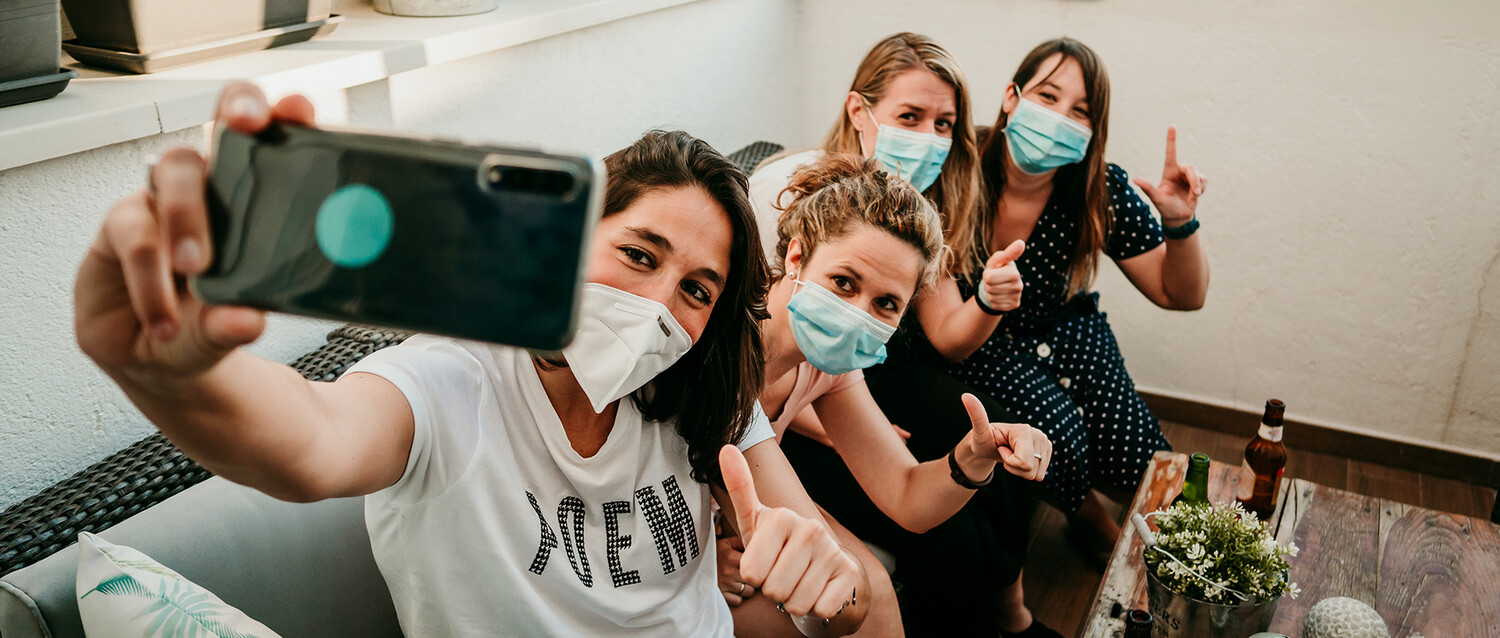You’re only young once. This expression makes Anneliese Moser a little sad. During the corona crisis, she turned seventeen during the first lockdown and eighteen during the second. The pandemic, which has determined our daily lives for one-and-a-half years, has left its mark on everyone’s lives; in her case, it has mainly shaped her adolescence. “To me, being young means gaining experience, meeting many nice people and establishing networks. I haven’t missed bars or discos, I’ve mainly missed exchange with people my age,” she says. When the schools were shut, she lost a very important part of her life.
The young woman from near Salzburg has developed various strategies: in order to offset the lack of exchange, she registered for online seminars and listened to poetry slams online. “For balance, I started hiking in 2020. When the world is going mad in the valley, I go up the mountain,” she tells us. Anneliese Moser now has her school-leaving qualifications and has received a scholarship from the Studienstiftung of the Österreichischen Akademie der Wissenschaften (OeAW). In the autumn, she will continue her education at a university, although she doesn’t know what conditions await her. “During the pandemic I’ve learnt to take things as they come.”
Young people’s great adaptability
There are fewer severe cases of Covid-19 among young people than among adults. Recently, however, infection rates have also increased in young age groups. Out of consideration for the elderly, adolescents have already had to accept restrictions to their lives since the outbreak of the pandemic. Many adolescents and young adults are missing time together at school and in sport and leisure – at a time of their lives when peer groups and new-found freedoms are of great importance. At school and university or apprenticeships they have to display great adaptability: most exams and lectures were held online.
So that physical distance does not result in social isolation, Katharina Pollack has also moved a large part of her life to the virtual sphere. She is studying Sound and Music Computing at the University of Music and Performing Arts Graz and is a doctoral candidate at the Acoustic Research Institute of the OeAW. Lectures and classes are conducted via Zoom, as are doctoral groups. “For instance, we set up a writing group. We get together on Zoom, the video is on, the sound is off. That gives us the feeling of being in the same room and concentrating on work,” she says.
Virtual forms exchange have their limits
They soon searched for virtual alternatives at the Acoustics Research Institute too. “Otherwise you miss the social exchange. The young people in particular quickly got together and set something up,” the OeAW doctoral candidate recalls of the first lockdown. Pollack is growing increasingly tired of all conferences or other scholarly events having to be held online. “Meeting people and getting talking, that doesn’t always work online.”
But the limited nature of virtual life can also be felt in the private sphere, for instance birthday parties, when people have to celebrate via a screen, says Pollack. After all, only one person can talk at a time. Nevertheless: a big advantage is that her own social circle already has a high degree of immunisation.
Mental stress has increased among young people worldwide
What happens when young people do not have the opportunity to do what they would normally do for a long period of time –spending time with their peers rather than withdrawing at home? It varies across individuals, says Claus Lamm, a researcher at the University of Vienna’s Department of Cognition, Emotion and Methods in Psychology at the University and a member of the OeAW. “But generally, as social animals people need social contact and social support,” says the psychologist.
Another factor is that adolescence is a critical phase for forming one’s identity. “Put simply, as young people we learn to find or at least search for ourselves and our place in society. In principle, you can certainly catch up on all that, but according to international studies, there has been an increase in mental stress, including tangible illnesses like depression and anxiety disorder, particularly in young people, explains Lamm. What is now needed, he says, is targeted services and more awareness of the subject and every individual affected by it.
The socioeconomic effects of the pandemic magnify everything
The pandemic will leave its mark on all of society, but especially at its margins – for years to come, Claus Lamm is convinced. “Along with young people and their loss of education and apprenticeships, it also particularly affects people of lower socioeconomic status, but also people with mental illness.” The corona pandemic is often described as magnifying social fault lines, shining a light on existing inequality and problem areas.
“The last year and a half has been extremely challenging,” concludes Anneliese Moser. “But I’ve taken a lot from these circumstances that have tested all of us so much.” She is looking forward to the first activities of the OeAW Study Foundation and is proud of her resilience and her new serenity. Katharina Pollack sees things similarly. She has learnt a lot about herself, she says looking back. For instance, how she can organise herself when everyday structures like the daily route to work disappear. The acoustics researcher now plays music more frequently with her boyfriend. They both play the piano, the guitar and the double bass. “If there’s not much going on otherwise due to corona, we still have music together.”
